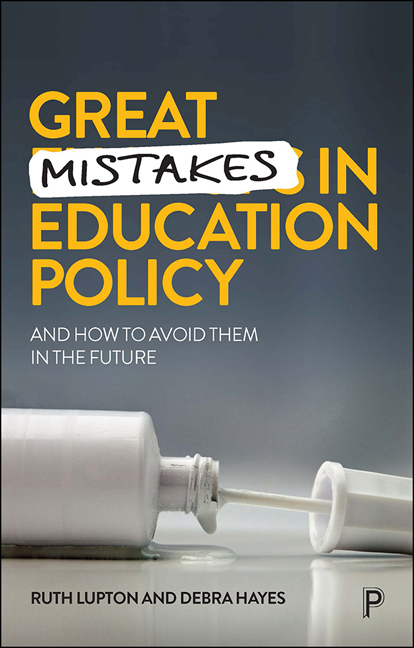Book contents
- Frontmatter
- Contents
- List of tables and boxes
- List of abbreviations
- Notes on the authors
- Acknowledgements
- 1 Introduction
- 2 Setting the scene
- 3 Tests, tests, tests
- 4 Schooling that works for some but not for others
- 5 Teachers making less of a difference
- 6 Mistake #1: turning to the market
- 7 Mistake #2: letting test scores drive policy
- 8 Mistake #3: over-prescribing teachers’ work
- 9 Mistake #4: misunderstanding educational inequalities
- 10 Mistake #5: leaving education out of education policy making
- 11 Synthetic phonics: a ‘perfect storm’ of policy mistakes
- 12 There are alternatives
- References
- Index
1 - Introduction
Published online by Cambridge University Press: 23 December 2021
- Frontmatter
- Contents
- List of tables and boxes
- List of abbreviations
- Notes on the authors
- Acknowledgements
- 1 Introduction
- 2 Setting the scene
- 3 Tests, tests, tests
- 4 Schooling that works for some but not for others
- 5 Teachers making less of a difference
- 6 Mistake #1: turning to the market
- 7 Mistake #2: letting test scores drive policy
- 8 Mistake #3: over-prescribing teachers’ work
- 9 Mistake #4: misunderstanding educational inequalities
- 10 Mistake #5: leaving education out of education policy making
- 11 Synthetic phonics: a ‘perfect storm’ of policy mistakes
- 12 There are alternatives
- References
- Index
Summary
Time to hit reset in education policy
This book is about the mistakes that have been made in education policy in England and Australia since the 1970s and how we can begin to put them right.
England and Australia are very different countries, with different education systems, histories and governance structures, but they have been following similar education policy trajectories. We argue that in many respects, these trajectories have made schooling in both England and Australia less rather than more able to meet the educational challenges our societies present.
In particular, as economic, social and spatial divisions have grown, the evidence is mounting that our education systems have become increasingly unfair in terms of access, opportunities, experiences and outcomes. And this is despite repeated political claims, over decades, that a major objective of education policies is to achieve greater equality of opportunity and greater social mobility based on more equal outcomes.
As we enter a new period of rapid technological, environmental, demographic and labour market change, super-charged by the COVID-19 pandemic and its disruptive effects, it is imperative we find ways to make our education systems work for all.
In this book, we argue that positive change is possible. There is no shortage of contemporary international examples that help point the way. But we need big policy changes, not policy ‘tweaks’. Taken-for-granted assumptions and well-established structures must be challenged, and a new consensus built for substantial change.
This will require changes in the nature of policy debates and a greater willingness to set aside whims, prejudices and longstanding antagonisms. We need to reclaim some of the common ground that exists in collective aspirations for children's and young people's wellbeing and success. It will also require changes in policy processes and timescales, and in the ways that policy makers draw on research and practice expertise. But above all, it will require willingness to confront the mistakes of the past, regardless of who has made them. Transformational change will not be achieved without a strong shared understanding of what has gone wrong as well as what has gone right, and why decades of policy effort have not produced education systems that are effective and fair.
- Type
- Chapter
- Information
- Great Mistakes in Education PolicyAnd How to Avoid Them in the Future, pp. 1 - 12Publisher: Bristol University PressPrint publication year: 2021

